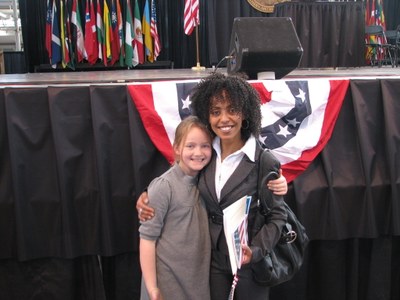
Purchase Tickets
Witnessing a Naturalization Ceremony
March 28, 2011

In November 2010, my family and I had the great honor to be invited to a naturalization ceremony. Kidist, a young Ethiopian woman who had married a friend, asked us to share her special day. We jumped at the opportunity as U.S.-born citizens, we had never witnessed a naturalization ceremony.
The ceremony was held in the midst of the International Festival in Indianapolis. Nearly 200 new citizens waited with their families and friends as the federal district court brought itself to order. My granddaughter, Aubrey, and I were fascinated by the rich blend of clothing, skin shades, hair types and facial features arrayed around us. All the countries of the world were named off, one by one, and individuals from those countries stood to be recognized. There were new citizens from nearly every country!
The federal judge explained the journey these men and women had taken to become citizens, studying U.S. history and government for five years and jumping through numerous administrative hoops.? It was a long and expensive undertaking, one that those born here would never have to endure. When the judge stated that these new citizens knew our country better than the rest of us, I was shaking my head yes in dumb amazement, with instant respect for these people from across the globe who had wanted so badly something that I had taken for granted all the days of my life.
One more statement caught my attention that day: Naturalization ceremonies take place in cities across the country every month. Think how many hundreds of new citizens from all the corners of the globe we add each year. Far from being a homogeneous nation, the United States is a multi-ethnic country, its growing diversity a continuous infusion of human wealth and opportunity.
____________________








